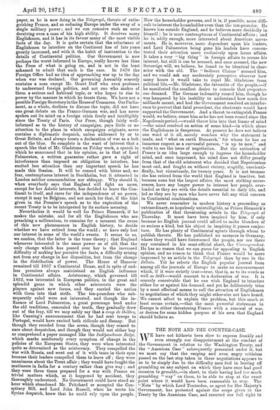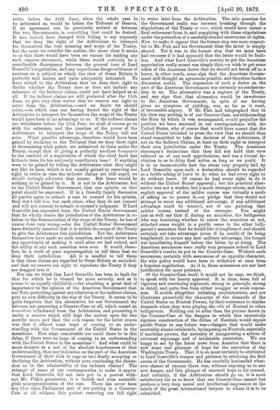THE NOTE AND THE COUNTER-CASE.
WE have not hitherto been slow to express frankly and even strongly our disappointment at the conduct of the Government in relation to the Washington Treaty, and the "American Case" subsequently presented under it, but we must say that the carping and even angry criticism passed on the last step taken in these negotiations appears to us to be simply due to the difficulty men feel in leaving off grumbling on any subject on which they have once had good occasion to grumble,—in short, to their having had too much grumbling " way" on them, to be able to stop at the exact point where it would have been reasonable to stop. The "Note" by which Lord Tenterden, as agent for Her Majesty's Government, has protested against the scope given to the Treaty by the American Case, and reserved our full right to retire before the 15th June, when the whole case to be arbitrated on would be before the Tribunal of Geneva, if no agreement can be previously arrived at between the two Governments, is everything that could be desired. It has, indeed, been charged with failing to say expressly that we deny the right of the Arbitrators to interpret for themselves the true meaning and scope of the Treaty, but the more we consider the matter, the more clear it seems to us that there would have been no excuse for making any such express statement, while there would certainly be a considerable discrepancy between the general tone of Lord Granville's negotiation, and any superfluous disagreeableness of candour on a subject on which the view of Great Britain is perfectly well known and quite adequately intimated. To have stated to the Arbitrators that we deny their right to decide whether the Treaty does or does not include any reference of the Indirect claims, could not have helped us at all. If the indirect claims are still preferred after the 15th June, we give very clear notice that we reserve our right to retire from the Arbitration,—and no doubt we should retire,—in which case our having denied the right of the Arbitrators to interpret for themselves the scope of the Treaty would have been of no advantage to us. If the indirect claims are withdrawn before the 15th June, we shall of course go on with the reference, and the question of the power of the Arbitrators to interpret the scope of the Treaty will not arise. What possible advantage, therefore, would have been gained by declaring to the Tribunal that we deny their right of determining what points are submitted to them under the Treaty, except that of giving a perfectly needless brusquerie to the conduct of a negotiation of which the chief fault has hitherto been its too anxiously conciliatory tone ? If anything were to be gained by telling the Arbitrators what they might not like to hear, which is not equally gained by reserving our right to retire in case the indirect claims are still urged, we should strongly advocate that course. But there would be nothing to be gained by it. It is not to the Arbitrators, but to the United States' Government, that our opinion on that point should be expressed. If in a friendly family discussion all parties agree to submit a case to counsel for his opinion, they don't tell him, but each other, what they do not consent and will not consent to submit to counsel's judgment. If Lord Granville has concealed from the United States' Government that he wholly denies the jurisdiction of the Arbitrators in re- lation to the determination of the scope of the Treaty, he has of course done very wrong,—for the United States' Government have distinctly asserted that it is within the scope of the Treaty to give the Arbitrators this jurisdiction. But the Arbitrators themselves have made no such assertion, and could never have any opportunity of making it until after we had retired, and the utility of any such assertion were over. It would, there- fore, be a work of pure supererogation to tell them that we
deny their jurisdiction. All it is needful to tell them is that these claims are regarded by Great Britain as excluded, and that we reserve our right to repudiate the Treaty if they are dragged into it.
Nor can we think that Lord Granville has been in fault for that for which he is blamed far more severely, and as it seems to us equally childishly,—for attaching a great deal of importance to the opinion of the American Government that our Note, protesting against any admission of the indirect claims, puts no new difficulty in the way of the Treaty. It seems to be quite forgotten that the alternative for our Government lay between not presenting a Counter-Case at all, which meant an immediate withdrawal from the Arbitration, and presenting it under a reserve which still kept the matter open for two months more, and that the only reason for the latter course was that it offered some hope of coming to an under- standing with the Government of the United States in the meantime. Now what conceivable use could there be in this delay, if there were no hope of coming to an understanding with the United States in the meantime ? And what could be more decisive as a test of the absolute hopelessness of that understanding, than any indication on the part of the American Government of their wish to urge us into finally accepting or declining the Arbitration, without even concluding the discus- sion as to the admissibility of the indirect claims I The attempt of some of our contemporaries to make it appear that Lord Granville did not dare put in a protest with- out Mr. Fish's permission, is a foolish and even unintelli- gible misrepresentation of the case. There has never been any idea since Parliament met of our putting in a Counter- Case at all without this protest reserving our full right to retire later from the Arbitration. The only question for the Government -really was between breaking through the stipulations of the Treaty at once, which would have meant a final retirement from it, and complying with those stipulations under the protection of a carefully-worded reservation of rights. Now, to make it appear that the former step was more respect- ful to Mr. Fish and his Government than the latter is simply absurd. Yet it was to the former step that we must have had recourse if it had appeared that the latter would be fruit- less. And what Lord Granville's anxiety to get the American approbation really meant was simply this,—a wish to get some token of the American desire that we should not break off in a hurry, in other words, some sign that the American Govern- ment still thought an agreement possible, and therefore further discussion useful. The expression of such a desire on the part of the American Government was certainly no condescen- sion to us. The alternative was a rupture of the Treaty, and any sign that that alternative would be unwelcome to the American Government, in spite of our having given no symptom of yielding, was, so fax as it went, of favourable augury. If Mr. Fish had telegraphed that in his view any putting in of our Counter-Case, notwithstanding the Note by which it was accompanied, would prejudice the position we have assumed in our correspondence with the United States, why of course that would have meant that the United States intended to press the view that we should then stand committed to take the decision of the Arbitrators, if not on the Indirect Claims, at least on their right to interpret their own jurisdiction under the Treaty. The American statesmen's declaration that they did not hold that view relieved us of any such apprehension, and was a virtual in- vitation to us to delay final action as long as we could. It is to us inconceivable how the stress very properly laid by Lord Granville upon such a declaration should be regarded as a feeble asking of leave to do what he had every right to do without leave. Of course he had every right to do it without the United States' approval ; but the practical alter- native was not a weaker, but a much stronger course, and their explicit approval of the milder course was virtually a mode of asking us to pursue it,—a pledge that they would not attempt to wrest any additional advantage, if any additional advantage could be wrested, out of our pursuing that
milder course, instead of the stronger. You might just as well say that if, during an armistice, the belligerent who was hesitating whether to renew the armistice or not, attached some weight in a pacific sense to the other belli- gerent's assurance that he would like it lengthened, and should certainly not take advantage (even if he could) of its being lengthened, to secure any new military advantage, the former was humiliating himself before the latter, by so doing. The American assurances were really very germane indeed to Lord Granville's resolve to put in the Counter-Case. Without such assurances, certainly with assurances of an opposite character, the wise policy would have been to withdraw at once from a hopeless negotiation. As it is, these assurances are our best justification for more patience.
Of the Counter-Case itself, it world not be easy, we think, to speak with too hearty approval. It is clear, terse, full of vigorous and convincing argument, strong in principle, strong in detail, and quite free from either swagger or weak conces- sion. It avoids altogether irritating recriminations, and yet illustrates powerfully the character of the demands of the United States on Neutral Powers, by their resistance to similar demands when they were playing the role of Neutral to other belligerents. Nothing can be abler than the picture drawn in the Counter-Case of the dangers to which this excessively rigorous construction of the duties of Neutrals would expose pacific States in any future war—dangers that would make neutrality almost intolerable, by imposing on Neutrals, especially if maritime powers, the necessity of inaugurating a system of universal espionage and of intolerable restriction. We are happy to see by the latest news from America that there is now some real glimmer of hope for the execution of the Washington Treaty. That it is so, must certainly be attributed to Lord Granville's temper and patience in retrieving the first errors of the Government. He has carefully husbanded what- ever chance of success there was, without exposing us to one new danger, and this glimpse of renewed hope is his reward. And certainly, if the Arbitration should go on, it is most satisfactory for us to know that our Counter-Case cannot but produce a very deep moral and intellectual impression on the minds of the great international lawyers to whom it is to be submitted.



































 Previous page
Previous page